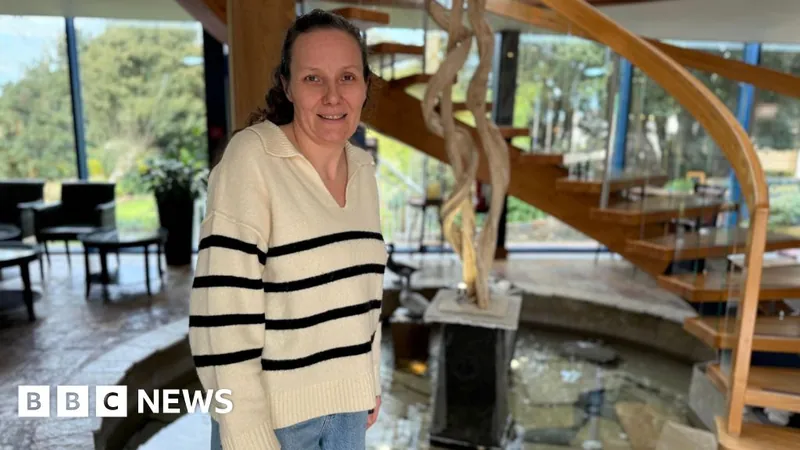
How COVID-19 Forever Changed Lives: Five Years Later
2025-03-24
Author: John Tan
The Ongoing Impact of COVID-19
As we reflect on the fifth anniversary of the initial COVID-19 lockdown on March 25, 2025, the impact of the pandemic is still profoundly felt across the globe. One compelling story comes from the island of Guernsey, where many individuals continue to grapple with the long-term effects of the virus.
Tamara O'Brien's Story
Tamara O'Brien, a resident of Guernsey, contracted COVID-19 in 2021 during the island's second lockdown and has since developed what is known as 'long Covid.' This debilitating condition has significantly altered her daily life. “It’s changed everything I can and can’t do,” O’Brien admits. She struggles with simple tasks, saying, “I find it hard to walk long distances, climb stairs, and I often experience pins and needles across my face and eyes.”
In the wake of her diagnosis, O’Brien took a proactive approach by establishing an online support group aimed at connecting other islanders facing similar challenges. “It’s been great to support each other,” she states, highlighting the importance of community in overcoming adversity.
Reorganizing Daily Life
COVID-19 has not only changed physical health but also how people plan their lives. For O'Brien, even managing routine household tasks requires careful consideration. “Once the kids are at school, I have to plan what I can do and what I can't,” she explains. Despite her limitations, O'Brien expresses gratitude for the understanding of her children. “They know if I’m too tired to go to the park, we can do something different, like crafts. We adapt and still enjoy our time together.”
Adapting Professional Practices
The pandemic also forced many professionals to rethink how they operate. Anita Davies, an antenatal teacher, was prompted to transition her classes online after requests from expectant parents seeking support. Initially resistant, she found herself embarking on “a real leap of faith” by conducting virtual classes. “These new parents needed guidance; if I hadn’t adapted, they would have been left without any preparation during a crucial time,” Davies recalls.
Interestingly, she noted that many parents may have found advantages during lockdown. “They were able to focus entirely on their new roles without the distractions of the outside world, such as returning to work or social commitments.”
Support for Vulnerable Populations
Meanwhile, Margaret Nicolle, from Age Concern Guernsey, dedicated countless hours reaching out to the charity’s users during the isolation of lockdown. “Some individuals received a lot of attention from their families, while others were left feeling incredibly lonely,” she shares. Particularly concerning were the members suffering from dementia, a condition exacerbated by stress and isolation.
However, Nicolle emphasizes that they took care in their approach, being mindful of how stress could affect those with cognitive disorders. “For some, even a phone call could confuse them further, so we had to be judicious,” she explains.
The Lingering Fear
Five years on, the lingering 'perceived fear' of COVID-19 remains palpable in the community. It is clear that partnerships among support networks, healthcare services, and families have become essential for recovery and resilience. As we continue to navigate this new normal, stories like those of O'Brien, Davies, and Nicolle illustrate the profound transformations and adaptations that individuals have made to cope in a post-COVID world. The question remains: how will we continue to support each other through these unprecedented challenges?
Looking to the Future
As we look to the future, one thing is certain: the echoes of COVID-19 will inform not just our health policies but our very way of life for years to come.




 Brasil (PT)
Brasil (PT)
 Canada (EN)
Canada (EN)
 Chile (ES)
Chile (ES)
 Česko (CS)
Česko (CS)
 대한민국 (KO)
대한민국 (KO)
 España (ES)
España (ES)
 France (FR)
France (FR)
 Hong Kong (EN)
Hong Kong (EN)
 Italia (IT)
Italia (IT)
 日本 (JA)
日本 (JA)
 Magyarország (HU)
Magyarország (HU)
 Norge (NO)
Norge (NO)
 Polska (PL)
Polska (PL)
 Schweiz (DE)
Schweiz (DE)
 Singapore (EN)
Singapore (EN)
 Sverige (SV)
Sverige (SV)
 Suomi (FI)
Suomi (FI)
 Türkiye (TR)
Türkiye (TR)
 الإمارات العربية المتحدة (AR)
الإمارات العربية المتحدة (AR)